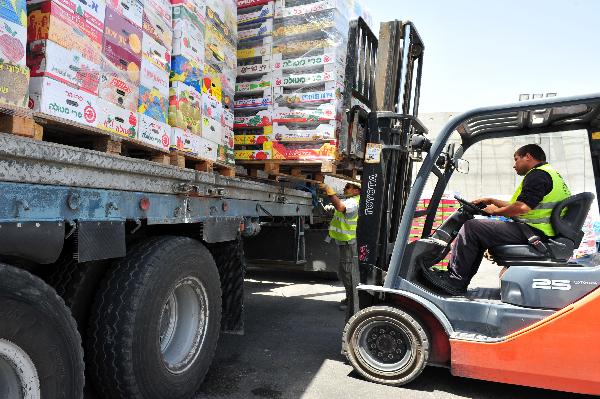Israel revises list of banned imports to Gaza
Israel on Monday released a list of items, including weaponry and what it called dual-use products, which it has banned from import into the Gaza Strip. The list replaced a much longer document that detailed civilian goods that were allowed to be brought into Gaza.
 |
|
Israeli security personnel inspect goods at the Kerem Shalom Crossing terminal before it is transferred to Gaza Strip, south Israel, June 21, 2010. The Israeli government on Sunday announced the steps to loosen its blockade on the Gaza Strip. [Rafael Ben-Ari/Xinhua] |
The restrictions on civilian goods have been largely rescinded due to international pressure over Israel's three-year-long blockade of the hostile Hamas-led government and over its deadly handling of the May 31 raid on an aid flotilla in which nine passengers were killed.
Israeli officials said the new regulations are meant to allow more civilian goods to reach the seaside enclave, while keeping out many raw construction items which Israeli officials said could be used for armament production, military structures construction and tunnels.
Israeli Prime Minister Benjamin Netanyahu, who is set to meet with U.S. President Barack Obama at the White House on Tuesday, is expected to bring up the list during their meeting. The meeting was delayed from last month, when Netanyahu flew back to Israel as the violent events on the deck of the Mavi Marmara unfolded.
Israel's security cabinet, on June 20, decided on steps aimed at easing the blockade by narrowing restrictions to two categories of controlled items.
The first category sets out totally banned items, including all arms, munitions and military-related materials, such as missile- related computer technology and similar devices. Other forbidden imports include chemicals, epoxy resins and types of fertilizers that Israel said could be used to make bombs and Kassam rockets.
The second category allowed in a limited range of raw construction materials that Palestinians said are needed to rebuild buildings and infrastructure destroyed by Israel during a large-scale offensive in December 2008 and January 2009, including raw concrete and concrete blocks, cement, lumber and steel-framing materials.
Israel stipulated, however, that the items be strictly limited to civilian reconstruction projects that are funded and supervised by international groups, and authorized by the Palestinian National Authority (PNA).
Israel's coordinator of government activities in the territories (COGAT) said the new policy is intended "to protect its citizens against terror, rocket and other attacks from Gaza," while "liberalizing" the entry of civilian goods.
Palestinians, however, said the lists are restrictive and arbitrary, and do not allow for exports, which they saw as choking off chances for economic relief for the poverty-stricken area.
Since Hamas' violent takeover of Gaza in 2007, Israel has imposed a tight blockade upon the enclave, incurring accusations from around the world that the siege has severely worsened the humanitarian situation of some 1.5 million Gaza residents.
Israeli Deputy Foreign Minister Danny Ayalon said last Thursday that Israel's policy is to increase the flow of civilian goods to Gaza.
Ayalon, speaking at the Kerem Shalom crossing point between Israel and Gaza near the Egyptian border, blamed Hamas for " complicating the situation" of getting aid to Palestinians.
Israel and the PNA were planning to expand operations at the Kerem Shalom and Karni crossings in order to expedite the movement of goods into Gaza, and the steps included "modifications of the infrastructure on both sides of the crossing, extending the operating hours of the crossings and augmenting the manpower," according to COGAT.
The foreign ministers of France, Italy and Spain will visit Gaza later this month to see how Israel is implementing the new policy, Spanish Prime Minister Jose Luis Rodriguez Zapatero said Monday in Madrid.
Zapatero's statement, made at a press conference with visiting Syrian President Bashar Assad, came in the wake of an invitation to visit Gaza by Israeli Foreign Minister Avigdor Lieberman last month.
 0
0 






